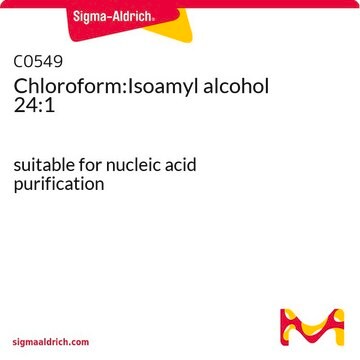C2432
Chloroform
contains 100-200 ppm amylenes as stabilizer, ≥99.5%
Synonym(s):
Methylidyne trichloride, Trichloromethane
About This Item
Recommended Products
vapor density
4.1 (vs air)
Quality Level
vapor pressure
160 mmHg ( 20 °C)
Assay
≥99.5%
form
liquid
contains
100-200 ppm amylenes as stabilizer
technique(s)
RNA extraction: suitable
refractive index
n20/D 1.445 (lit.)
bp
60.5-61.5 °C (lit.)
mp
−63 °C (lit.)
density
1.492 g/mL at 25 °C (lit.)
SMILES string
ClC(Cl)Cl
InChI
1S/CHCl3/c2-1(3)4/h1H
InChI key
HEDRZPFGACZZDS-UHFFFAOYSA-N
Looking for similar products? Visit Product Comparison Guide
General description
Application
Signal Word
Danger
Hazard Statements
Precautionary Statements
Hazard Classifications
Acute Tox. 3 Inhalation - Acute Tox. 4 Oral - Carc. 2 - Eye Irrit. 2 - Repr. 2 - Skin Irrit. 2 - STOT RE 1 Oral - STOT SE 3
Target Organs
Central nervous system, Liver,Kidney
Storage Class Code
6.1D - Non-combustible acute toxic Cat.3 / toxic hazardous materials or hazardous materials causing chronic effects
WGK
WGK 3
Flash Point(F)
does not flash
Flash Point(C)
does not flash
Choose from one of the most recent versions:
Already Own This Product?
Find documentation for the products that you have recently purchased in the Document Library.
GC-MS-Based Analysis of Chloroform Extracted Suberin-Associated Root Waxes from Arabidopsis and Other Plant Species.
Articles
Substances are said to be miscible in one another if they dissolve to form a uniform solution. Bookmark or download our miscibility table for common lab solvents.
Substances are said to be miscible in one another if they dissolve to form a uniform solution. Bookmark or download our miscibility table for common lab solvents.
Substances are said to be miscible in one another if they dissolve to form a uniform solution. Bookmark or download our miscibility table for common lab solvents.
Substances are said to be miscible in one another if they dissolve to form a uniform solution. Bookmark or download our miscibility table for common lab solvents.
Protocols
Preparation for biodegradable nanoparticles and their use in transfection protocols .
Preparation for biodegradable nanoparticles and their use in transfection protocols .
Preparation for biodegradable nanoparticles and their use in transfection protocols .
Preparation for biodegradable nanoparticles and their use in transfection protocols .
Our team of scientists has experience in all areas of research including Life Science, Material Science, Chemical Synthesis, Chromatography, Analytical and many others.
Contact Technical Service





